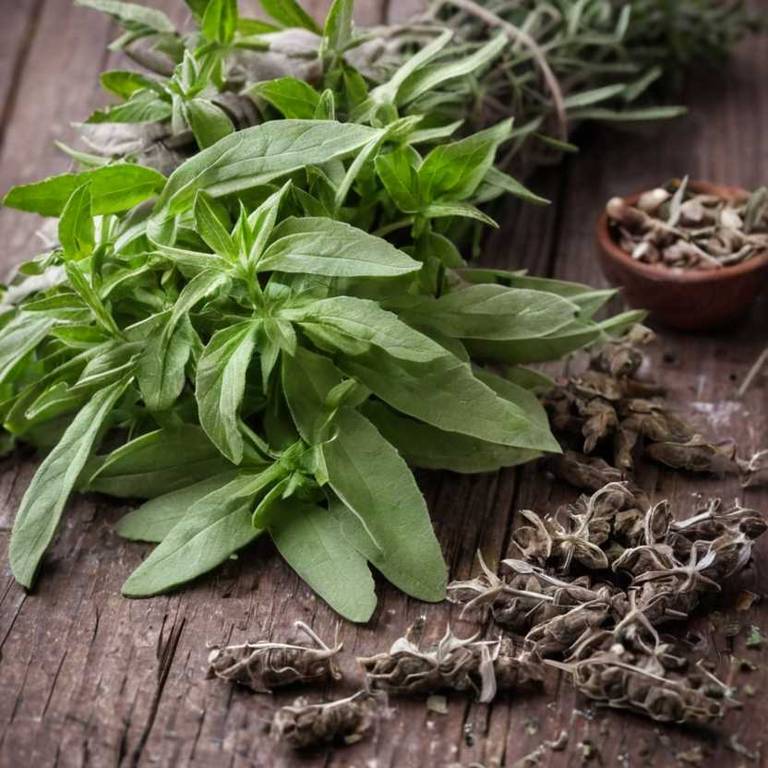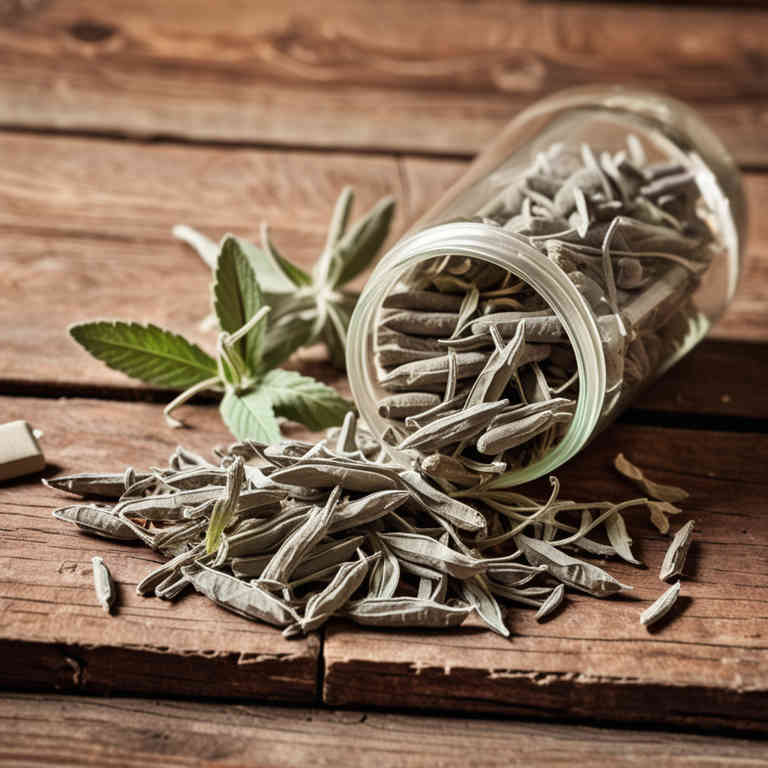10 Best Salvia Officinalis Preparations

The best medicinal preparations of Salvia officinalis are teas, decoctions, tinctures, lozenges, and creams, each offering unique benefits for various health conditions.
Teas made from dried leaves are commonly used to soothe digestion and reduce anxiety.
Decoctions involve simmering the herb to extract its more robust compounds, often used for respiratory support.
Tinctures provide a concentrated form of the plant’s active ingredients, suitable for targeted therapeutic use.
Lozenges are ideal for addressing sore throats and coughs, while creams can be applied topically to reduce inflammation and promote skin healing.
Below there's a list of the 10 best herbal preparations of salvia officinalis for medicinal purposes.
- 1. Teas
- 2. Decoctions
- 3. Tinctures
- 4. Lozenges
- 5. Creams
- 6. Syrups
- 7. Mucillages
- 8. Capsules
- 9. Oinments
- 10. Gargles
1. Teas
Salvia officinalis teas is commonly used to support digestive health, reduce stress, and alleviate symptoms of anxiety and insomnia.
This herbal preparation is often employed to treat ailments such as indigestion, bloating, and gastrointestinal discomfort. It is also used to soothe sore throats, reduce inflammation, and promote oral health. The bioactive constituents responsible for its medicinal properties include flavonoids, phenolic acids, and terpenes, which have antioxidant, anti-inflammatory, and antimicrobial effects.
Additionally, compounds like rosmarinic acid and carnosic acid contribute to its therapeutic benefits.

2. Decoctions
Salvia officinalis decoctions is commonly used to treat digestive issues, anxiety, and respiratory conditions.
These preparations are often employed to alleviate symptoms such as indigestion, bloating, and stomach cramps. They are also used to calm the nervous system and reduce stress-related ailments. The bioactive constituents responsible for these effects include rosmarinic acid, flavonoids, and volatile oils like cineole and camphor.
These compounds contribute to the plant's anti-inflammatory, antioxidant, and antimicrobial properties.

3. Tinctures
Salvia officinalis tinctures is commonly used to treat a variety of ailments, including digestive issues, anxiety, and inflammation.
These tinctures are often utilized for their calming effects on the nervous system and their ability to support respiratory and digestive health. The most common medicinal uses include alleviating symptoms of irritable bowel syndrome, reducing stress and anxiety, and easing symptoms of menstrual cramps. Bioactive constituents such as rosmarinic acid, flavonoids, and essential oils contribute to the anti-inflammatory, antioxidant, and neuroprotective properties of the tinctures.
These compounds work synergistically to provide the therapeutic benefits associated with Salvia officinalis.

4. Lozenges
Salvia officinalis lozenges is commonly used to relieve symptoms of sore throat, cough, and inflammation in the respiratory tract.
These lozenges are often prescribed for treating conditions such as bronchitis, laryngitis, and other inflammatory respiratory disorders. The bioactive constituents responsible for their medicinal properties include flavonoids, rosmarinic acid, and essential oils like carnosic acid and carvacrol. These compounds possess anti-inflammatory, antioxidant, and antimicrobial effects.
Additionally, salvia officinalis lozenges may also support digestive health and reduce stress due to their adaptogenic properties.

5. Creams
Salvia officinalis creams is commonly used to treat various skin conditions and promote healing due to the plant's anti-inflammatory and antioxidant properties.
These creams are often applied for ailments such as eczema, psoriasis, and minor burns, as well as to soothe muscle pain and inflammation. The most common medicinal uses include reducing skin irritation, improving wound healing, and alleviating symptoms of digestive disorders when applied topically. The bioactive constituents responsible for these effects include rosmarinic acid, flavonoids, and essential oils like camphor and thymol, which exhibit anti-inflammatory, antimicrobial, and analgesic properties.
These compounds work synergistically to enhance the therapeutic benefits of the herbal preparation.

6. Syrups
Salvia officinalis syrups is commonly used to soothe respiratory issues, digestive discomfort, and promote oral health.
These syrups are often employed to treat coughs, sore throats, indigestion, and inflammation of the gums or mouth. The bioactive constituents responsible for these effects include flavonoids, rosmarinic acid, and essential oils such as cineole and camphor. These compounds exhibit anti-inflammatory, antimicrobial, and antioxidant properties.
Additionally, they may support immune function and aid in the relief of muscle pain and stress.

7. Mucillages
Salvia officinalis mucillages is commonly used to soothe inflammation and irritation in the digestive and respiratory systems.
This herbal preparation is often employed to treat ailments such as gastritis, ulcers, sore throat, and cough. The mucillages, which are thick, gel-like substances, form a protective layer over mucous membranes, reducing irritation and promoting healing. The bioactive constituents include polysaccharides, flavonoids, and phenolic compounds, which exhibit anti-inflammatory, antioxidant, and antimicrobial properties.
These components work synergistically to enhance the therapeutic effects of the preparation.

8. Capsules
Salvia officinalis capsules is commonly used to support digestive health, alleviate stress, and promote respiratory wellness.
They are often employed to treat ailments such as indigestion, anxiety, and coughs. The most common medicinal uses include soothing gastrointestinal discomfort, reducing inflammation, and enhancing cognitive function. The bioactive constituents responsible for these effects include rosmarinic acid, flavonoids, and essential oils like camphor and thujone.
These compounds contribute to the plant's antioxidant, anti-inflammatory, and calming properties.

9. Oinments
Salvia officinalis oinments is commonly used to treat skin conditions, digestive issues, and respiratory ailments.
These oinments are often applied topically to soothe inflammation, reduce pain, and promote wound healing. They are also used internally to alleviate symptoms of indigestion, bloating, and irritable bowel syndrome. The bioactive constituents responsible for these effects include compounds such as rosmarinic acid, flavonoids, and essential oils like carnosic acid and camphor.
These compounds exhibit anti-inflammatory, antioxidant, and antimicrobial properties, contributing to the overall therapeutic value of the preparation.

10. Gargles
Salvia officinalis gargles is commonly used to alleviate symptoms of sore throat, cough, and oral infections due to its antimicrobial and anti-inflammatory properties.
The most common medicinal uses of this preparation include treating sore throats, mouth ulcers, and respiratory tract infections. It is also sometimes used to reduce inflammation and pain associated with dental issues. The bioactive constituents responsible for these effects include flavonoids, rosmarinic acid, essential oils, and phenolic compounds.
These compounds contribute to its antimicrobial, antioxidant, and anti-inflammatory actions.
